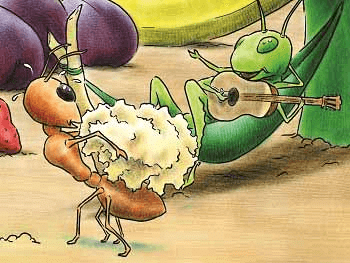NCERT Solutions for Class 8 English - Poem - The Ant and the Cricket
Working with the Poem
Q1. The cricket says, "Oh! What will become of me?" When does he say it, and why?
Ans: The cricket said the given line when it found that its cupboard was empty and winter had arrived. It could not find a single crumb to eat on the snow-covered ground and there were no flowers or leaves on the tree.
It wondered what would become of it because it was getting cold and since there was nothing to eat, it would starve and die.
Q2. (i) Find in the poem the lines that mean the same as "Neither a borrower nor a lender is" (Shakespeare).
(ii) What is your opinion of the ant’s principles?
Ans:
(i)The lines in the poem that means the same as “Neither a borrower nor a lender be” are 'But we ants never borrow; we ants never lend.'
(ii) I agree with what the ant says first that one should save something for the future so that he does not need to borrow or lend. But I don’t agree with the ant’s principle what he told later. If he says he is a friend of cricket then he should also help the cricket at the time of distress. On the other hand, I believe that a friend in need is a friend indeed.
Q3. The ant tells the cricket to "dance the winter away". Do you think the word 'dance' is appropriate here? If so, why?
Ans: When the ant told the cricket to “dance the winter away”, she meant the cricket didn’t utilize his precious time and the available resources during summer to save up enough for the cold season. He was making merry and dancing his way when the sun was shining bright. Therefore, when the ant mentions about the word ‘dance’, she means that the cricket should try to dance and sing in the winter just as he did during the summer and not bother her by asking for food and shelter. Hence, the word ‘dance’ in context is associated with the irresponsible and careless nature of the cricket who made merry when the sun shone bright, but didn’t save adequate food to survive in the winter season.
Q4. (i) Which lines in the poem expresses the poet's comment? Read them aloud.
(ii) Write the comment in your own words.
Ans:
(i) The lines in the poem that expresses the poet's comments are “Folks call this a fable. I'll warrant it true.”
(ii) This comment by the poet means that this poem is indeed a fable as it had a moral behind it. The cricket did not have anything to eat during the winters because it did not bother to store some food during summers.
It was negligent and sang all through the summers. The ant, on the other hand, had built a nice home for itself and had stored food so that it would not starve during winters.
It worked hard during summers to achieve this. Thus, the moral of the poem is to be prepared for adverse times and always work hard instead of being negligent.
|
15 videos|164 docs|20 tests
|
FAQs on NCERT Solutions for Class 8 English - Poem - The Ant and the Cricket
| 1. What is the central theme of the poem "The Ant and the Cricket"? |  |
| 2. What are the contrasting characteristics of the ant and the cricket in the poem? |  |
| 3. How does the poet use imagery to convey the message of the poem? |  |
| 4. What is the significance of the cricket's song in the poem? |  |
| 5. How does the poem "The Ant and the Cricket" teach us a moral lesson? |  |

|
Explore Courses for Class 8 exam
|

|


















